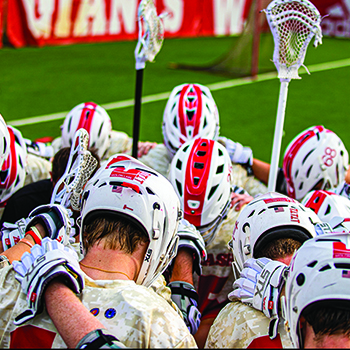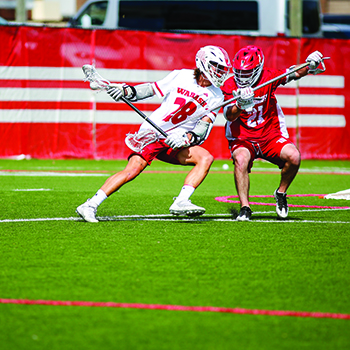Strolling through the Hall of Giants in the concourse of Little Giant Stadium, one cannot help but admire how Wabash keeps its traditions and those who represent them close at heart.
Scores of athletes and coaches across generations from almost every sport are represented, enshrined for their dedication to the College—both on and off the field.
One sport, however, is noticeably absent.
Wabash lacrosse.
Still in its infancy, this shiny, less-than-a-decade-old program is trying to forge its path into the annals of Wabash history.
With five coaches in nine years, Wabash lacrosse is desperate for consistency. Having never posted a season record above .500, the team is also looking for leadership to deliver a winning formula to compete in the NCAC, a perennial powerhouse lacrosse conference.
Head Lacrosse Coach Chris Burke is close to delivering.
Beginning his third season as head coach, Burke has already become Wabash’s all-time-winningest lacrosse coach, propelled by his team’s 7–9 record in the 2023 season.
While the scorecards didn’t always indicate it, this past season marked a monumental culture shift within the team, and Burke and players dedicated themselves to carving out their vision of tradition within the program.
First order of business: curating their own unique team dynamic, a staple for any successful sports program. And Burke knows that his grueling coaching style influences the team’s mentality.
“I’m not an easy coach to play for,” says Burke, who came to Wabash from Maryville University in St. Louis, where he served four seasons as the first assistant coach, defensive and goalie coach, and recruiting coordinator for the men’s lacrosse program.
Prior to coaching, Burke served as a member of the United States Marine Corps for five years. He rose to the rank of corporal and received a Purple Heart after being wounded in combat in Operation Enduring Freedom in Afghanistan.
“I put my guys through the wringer,” Burke explained, “because I know that’s what it’s going to take to do the things we have to do down the road.”
Burke’s coaching style isn’t for everyone. The team saw plenty of attrition during the offseason after 2022, leaving the team at a scant 19 in January—a number practically unheard of in a sport that usually boasts 50-to-60-person teams at most colleges.
Trying to field a competitive squad with 19 isn’t just hard, it can almost feel impossible, Burke explained. Without an adequate number of substitutes, Wabash players had to be fitter, smarter, and more committed than ever if they wanted to compete at all.
 What’s more, of those 19 players, more than half were freshmen. Burke said youthful talent and exuberance creates the opportunity for a clean slate and a chance for the team to control their own destiny.
What’s more, of those 19 players, more than half were freshmen. Burke said youthful talent and exuberance creates the opportunity for a clean slate and a chance for the team to control their own destiny.
“My job is to provide these guys a path where they can find success,” Burke says, “and give them the tools they can utilize to get to success.”
This gives players ownership of their team and a sense of responsibility about their futures and the future of the program.
Ethan Stonis ’23, former team captain, says despite the small squad, Burke remained focused as a mentor.
“Coach Burke allowed us to do the work but guided us in the right direction instead of trying to be the one to do it all,” he says.
These tools don’t come without a price, however. Reconstructing a program takes focus and effort on the practice field and in the weight room. It also requires players to develop in the offseason the skills necessary to perform during the season. But, since Wabash competes at the Division III level, coaches cannot require an offseason training program, so the preparation must come from the players.
Team captain Quinn Fitzgerald ’26 understands the need for his squad to work harder than ever before this offseason to continue the success of last season and build upon the precedent that the past two years have set.
“As the offseason progresses, we just need to continue to make sure guys are getting in the weight room, hitting the wall, hitting the cage, and doing everything we need to do,” says Fitzgerald. “So we can turn those close losses we had last year into wins.”
This year’s freshman class includes several high school All-Americans, giving Wabash lacrosse a chance to capitalize on the preparation of past seasons and combine it with high-octane talent.
Now, with almost all the pieces in place, they’ll just need a little Wabash magic and some new traditions to ensure they maintain their standards and continue to transform into a top team in the NCAC, battling the likes of Denison University and Kenyon College.
And Burke knows it. To tap into Wabash’s penchant for tradition, he’s established some of his own.
The Hard Hat of the Day is an award given to the player at each practice who exhibits the best “hard hat” mentality, a toughness and commitment to excellence voted on by the team captains. The other two awards—the Hammer and the Game Stick—are given out to the best and second-best individual performances after a win, as voted on by the coaching staff.
The current lacrosse players may not end up in the record books nor be remembered as Wabash legends. But to future lacrosse players, they will be. Their efforts laid the foundation for a program that needed someone, anyone, to do so. That’s all that matters. Wabash has its traditions—many of them. But it definitely has room for one more.